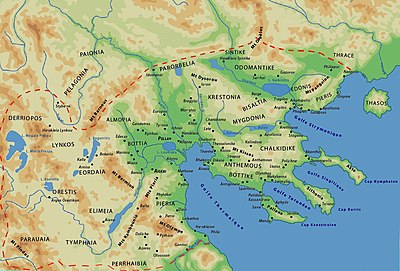Perrhäber
The Perrhäber or Perrhaiber ( ancient Greek Περραιβοί Perraiboi ) were a Pelasgic tribe in ancient Greece .
They originally came from the island of Euboia . As a powerful and warlike tribe, they are said to have destroyed the city of Hestiaia there and driven its inhabitants to the mainland, where they settled in the Thessalian province of Hestiaiotis . The Perrhäber soon followed, however, and also settled in Hestiaiotis and in the province of Pelasgiotis .
That area in the north was named after them Perrhäbia or Perrhaibia (Περαιβία). It stretched from Macedonia to the Peneus River and from the Pindus to the Ossa Mountains. In addition to towns on the plains, the mountain festivals were particularly important, such as Gonnos at the Tempe valley bottleneck, from where the route to Macedonia could be controlled. This was shown, among other things, when the Perrhäber were temporarily subjugated by the Lapiths (or the corresponding historical people): The mountain dwellers almost always seemed to have maintained their freedom. The Perrhäber of the plain evaded to Athamania on the west side of the Pindus, which is why Strabo counted them among the Aitolians .
The Perrhäber were among the founding members of the Delphic Amphictyon League . At the time of the Peloponnesian War , they were subjugated by the Thessalian Larissaeans. Later they came under Macedonian rule for a short time through Philip II . After Philip V was defeated by the Romans , he had to release all tribes at the behest of the Senate , whereupon the Perrhäber 196 BC. Were declared as "free, independent and autonomous".
In Greek mythology the Perrhäber inhabited the area around Dodona . Together with the Ainianen they marched against Troy under Guneus .
literature
- Albert Forbiger : Perrhaebi . In: Real Encyclopedia of Classical Classical Antiquities in alphabetical order . Volume 5, Stuttgart 1848, pp. 1357f.
- Robert Malcolm Errington : Perrhaiboi. In: The New Pauly (DNP). Volume 9, Metzler, Stuttgart 2000, ISBN 3-476-01479-7 , Sp. 598.
Individual evidence
- ↑ Christian Daniel Beck : Instructions for more precise knowledge of the general history of the world and peoples , Leipzig 1813; Volume 1, Part 1, p. 845 ( Google Books )
- ^ Brockhaus, General Encyclopedia of Sciences and Arts , Leipzig 1842; Volume 17, pp. 258ff. ( Google Books )
- ↑ Strabon 9, 5, 19 ( English translation ).
- ↑ Titus Livius : Ab urbe condita 33, 32 ( web link )
